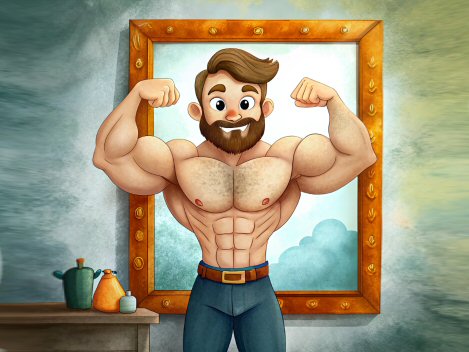Do women prefer men with muscles?
Do women prefer men with muscles?
 Preferences for physical attributes like muscles can vary greatly among individuals and are influenced by personal preferences, cultural norms, and societal ideals of attractiveness.
Preferences for physical attributes like muscles can vary greatly among individuals and are influenced by personal preferences, cultural norms, and societal ideals of attractiveness.
While some women may be attracted to men with muscular bodies, it’s important to note that not all women have the same preferences.
Some women might prioritise different qualities such as personality, sense of humour, intelligence, kindness, and compatibility over physical appearance. So what is attractive?
The question of whether women prefer men with muscles has been debated for generations, and the answer, like many matters of personal attraction, is not straightforward. While media and societal norms have often promoted the idea of the muscular male as the epitome of attractiveness, the reality is far more nuanced. Attraction is subjective, and preferences vary widely among individuals, shaped by cultural, psychological, and personal factors.
Cultural influences and media
Historically, the image of the ‘ideal man’ has fluctuated, influenced by cultural shifts and media portrayals. In the 1980’s and 1990’s, movies featuring muscular action stars like Arnold Schwarzenegger and Sylvester Stallone popularised the image of the hyper-masculine, muscle-bound alpha-male type man. This trend continued into the 2000’s, with superheroes and athletes frequently depicted as strong, muscular, and powerful in films and advertisements. Such imagery created a lasting association between muscles and masculinity in popular culture.
However, media representations don’t always reflect real-world preferences. While some women may be drawn to the traditional image of physical strength and musculature, others may prioritise different attributes, such as intelligence, kindness, or a good sense of humour. Physical appearance, including muscles, is only one aspect of attraction and by no means the deciding factor for all women.
Evolutionary perspectives
From an evolutionary standpoint, physical strength and fitness were historically linked to survival. In ancient times, a man’s physical prowess could determine his ability to protect and provide for his family. This idea has been carried into modern evolutionary psychology, which suggests that some women may still be biologically inclined to prefer physically strong men because of the historical connection to protection and security.
That said, evolutionary psychology is just one theory, and not every individual subscribes to these patterns. Modern society has evolved beyond the need for physical strength as a primary survival tool, and many women may no longer associate muscles with protection or attractiveness.
Psychological and personal preferences
Individual preferences are highly subjective, and many women may be drawn to factors beyond the physical. Confidence, emotional intelligence, and a sense of humour are often mentioned as desirable traits. While a muscular physique might catch someone’s eye, it is usually the person’s character and personality that sustain long-term attraction. Studies have shown that traits such as kindness and reliability tend to rank higher in importance for women when choosing a partner.
Additionally, the idea that all women prefer a certain body type can be problematic. People are diverse in their preferences, and attraction is influenced by personal experiences, values, and even subconscious associations. Some women may find leaner, less muscular body types more appealing, while others might not prioritise physical appearance at all.
The role of muscles in attraction
While some women may be attracted to muscular men, others might prioritise different traits entirely. Attraction is a complex, multifaceted experience that goes beyond physical appearance.
In conclusion, muscles may enhance physical appeal for some women, but they are far from the sole determinant of attraction. A healthy balance of physical fitness, confidence, and emotional intelligence is likely to be more universally appealing than focusing solely on building muscle.
In the end, personal connections and shared values often outweigh superficial qualities in long-term relationships.
























